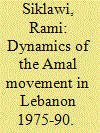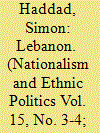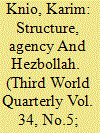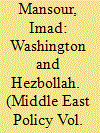| Srl | Item |
| 1 |
ID:
112442


|
|
|
| 2 |
ID:
108700


|
|
|
|
|
| Publication |
2009.
|
| Summary/Abstract |
This article seeks to interpret recent developments in Lebanon in the light of a well-known theory, consociationalism, which presents itself as a model for the government of deeply divided societies. It therefore begins by looking at the character of this particular approach to government, describing the main features of consociationalism. The next section explores the historical background to contemporary Lebanese politics, from the pre-independence period to the 2005 crisis. This is followed by a discussion of events since 2005, and of the changing dynamics of Lebanese politics. The last section seeks to interpret these events, returning to the question of consociationalism and questioning its relevance in understanding the Lebanese conflict.
|
|
|
|
|
|
|
|
|
|
|
|
|
|
|
|
| 3 |
ID:
123526


|
|
|
|
|
| Publication |
2013.
|
| Summary/Abstract |
The role and nature of Hezbollah's involvement in Lebanese politics has been an omnipresent topic in Middle Eastern studies. The recent 'Arab Spring' uprisings further accentuated this complex role, given the party's support for every single popular resistance movement in the Arab world, with the exception of Syria, its major political ally in the region. This stark contradiction highlights once again the question of how far Hezbollah should be perceived as a proxy client of both Iran and Syria or whether it represents an intrinsic and genuine local resistance movement. In this article I argue that scholarly treatment of Hezbollah's nature, which has oscillated between structure-led, agency-led and dualistic types of analyses, is problematic. The article proposes a historically situated dialectical analysis of structure-agency which can potentially explain better how a legitimate social force can still be understood within the premises of proxy client politics.
|
|
|
|
|
|
|
|
|
|
|
|
|
|
|
|
| 4 |
ID:
096908


|
|
|